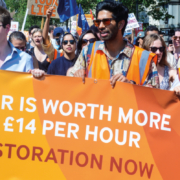Resident doctors’ strike
A strike by resident doctors (formerly known as junior doctors) will go ahead in England and Wales from 6:59 am this Friday (25 July) to 6:59 am next Wednesday (30 July). This is the first round of industrial action since the BMA and government struck a deal for the last pay round in the early autumn of 2024.
The dispute centres on the concept of ‘full pay restoration’, specifically that resident doctors’ salaries have continued to decline by 21 per cent in real terms since 2008, even despite the significant pay deal of last year. However, there is much more to it than that – the demand for pay restoration also expresses a dissatisfaction at the increasingly harsh conditions faced by residents. The starting salary for a first-year foundation level doctor (ie those who have just graduated will start work in early August this year) is only about £5 an hour above the ‘living’ or minimum wage, according to the British Medical Association.
Additionally, resident doctors begin their careers with debts of up to £100,000 from their studies (and in some cases, considerably more). Many report serious problems with covering rent, food and repaying their student debts. In their first two years, they undertake rotations, often in hospitals and cities far from their homes, which frequently requires them to stay in temporary accommodation, changing every three to four months. They are also working within a health system many describe as being close to collapse. Most importantly, their peer support is limited due to these rapid rotations. All this leads many to temporarily step away from training after their initial two foundation years.
In short, many would say that this is as much about working conditions and student debt as it is about pay restoration.
Some dispute the pay restoration figures, pointing out that residents received a 22 per cent rise last year and an above-inflation 5.4 per cent offer this year. Nurses and other healthcare workers who have also complained about pay erosion over the last decade or more have been offered less this year, and disquiet is growing that they have not received a comparable offer.
And while the BMA emphasises a 90 per cent vote in favour of industrial action, this is on a 55 per cent turnout of the resident doctor membership. Out of all eligible members, the vote is nearer to 50 per cent. Still a sizeable vote in favour, but it suggests that support is not as strong for this round of strikes; in 2024, the vote was 98 per cent for industrial action on a 71 per cent turnout.
The government has indicated its willingness to engage in talks, and the BBC reports that these discussions have been ongoing until this afternoon. However, the Government has made clear that the 26 per cent pay rise the BMA is demanding to restore pay to 2008 value is not possible. Discussions appear to be centred on other working condition adjustments, such as writing off a proportion of student debt. But for now, we wait to hear if further negotiations will proceed now that the strike has been confirmed.
This all may cause some to ask whether the nuclear option of strikes has been rushed into this year, rather than first taking other steps towards a negotiated settlement. It is clear that many issues need to be resolved. However, given the state of national finances and the need for equity for other NHS staff, perhaps a less aggressive stance is warranted at this stage in the process.
CMF members at all career stages and from all professions will hold different perspectives on this strike, its reasons, and its execution. We would certainly ask that all our members bear with each other in grace. Whilst there are no easy answers, and no simple solutions, that does not mean a resolution is impossible.
So, CMF encourages our members to pray. Pray for resident doctors who are struggling as they work in challenging conditions. Pray for the safety of patients and for senior staff who will provide cover for residents during this weekend’s strike, especially as routine appointments are not being cancelled on this occasion. Pray for those who are currently unsure about strike action, and for those who have more settled opinions for and against; pray for grace and understanding of one another’s positions. And pray that there is a just and fair resolution to this dispute that recognises the genuine struggles that resident doctors face, but that is realistic in the face of the economically challenging environment in which the NHS currently exists. Above all, pray for real wisdom and grace for all involved in this challenging situation.



